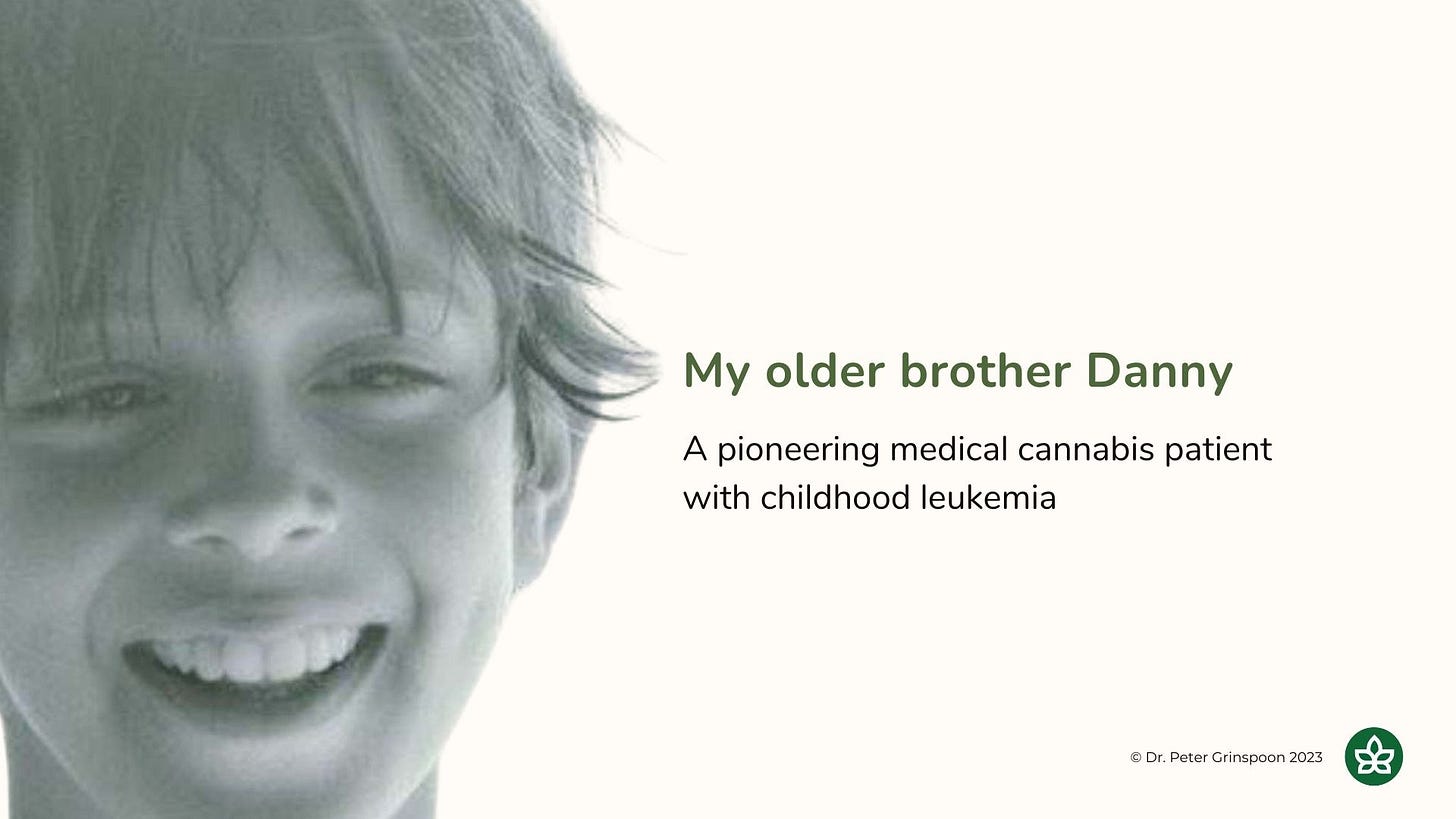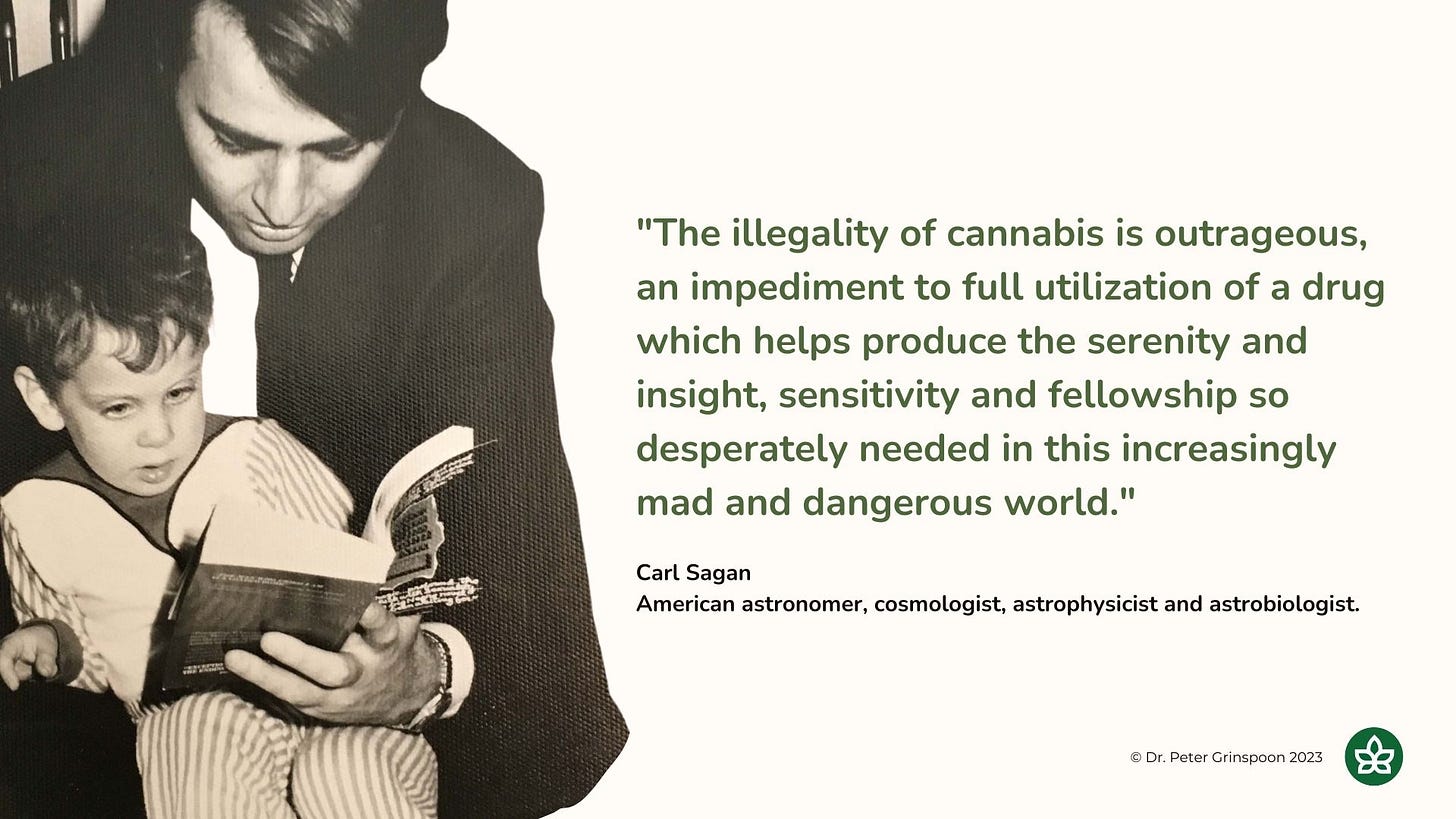DARE To Tell the Truth About Drugs
How, as a teen, dishonest anti-drug messaging eroded my respect for authority
Today we are discussing the DARE program (Drug Abuse Resistance Education), which was a widely implemented, drug war motivated, direct propaganda dump into the brains of an entire generation. Just thinking about having to suffer through this ritualized annual nonsense in both middle school and high school is enough to make me want to reach for the bong, in order to palliate the traumatic memory of the untruths we were exposed to. The gulf between my childhood experiences at home, witnessing cannabis use by a group of profoundly motivated scholars and activists, and used by my brother Danny to fight chemotherapy symptoms, contrasted with the annual DARE nonsense about marijuana, was wider than known feature in our expanding universe.
My brother Danny
I was born into a cannabis permissive household for two reasons. First, my brother Danny was using medical cannabis successfully as he was bravely losing his battle with childhood leukemia. My mom had to obtain cannabis illegally from a high school friend of Danny’s at Wellesley High School. (I detail this scene in my recent book, ‘Seeing Through the Smoke’ ) When Danny didn’t use cannabis, he’d lie in his bed, barfing for days after his chemotherapy. When he did smoke marijuana, he was able to eat, to hold down food, to strum on his Fender Stratocaster, and to come down and play with his little twin brothers. I started to develop an association between the smell of cannabis and the process of healing.
Dr. Lester Grinspoon
My childhood home cannot accurately be described as anti-cannabis. My dad was, literally, the intellectual foundation of the legalization movement, starting with his 1971 masterpiece ‘Marihuana Reconsidered’. This book was reviewed on the front page of the NYT book review (‘The Best Dope on Pot So Far’). My dad called for an end to criminalization of weed. On the cover of the paperback version it says, ‘Before we put all of our children in jail, let’s take an adult look at marijuana’. Amen to that. I have several blogs on my Substack about his monumental influence, his role in preventing Richard Nixon from deporting John Lennon because of an old drug charge, how Richard Nixon called him a ‘clown’ in one of his daily briefings, and his close friendship with the most brilliant person of all, Astronomer Carl Sagan.
As a result of my dad’s passion, magnetic personality and idealistic beliefs, my childhood home was full of a wide variety of academics, social justice warriors and cultural icons – many of whom were passing around the peace pipe while having the most mind-blowingly brilliant conversations I have heard, to this date. As a child, then a teen, I could listen as long as I wasn’t noticed (I wasn’t supposed to be near the peace pipe, as if it were some magical totem for adults only).
These profoundly engaging discussions were about social justice, literature, current events, the nuclear threat, and other issues such as whether there was life on other planets. This exposure motivated me to read every book that I could get my hands on and to always study as hard as I could. I wanted to grow up to be someone who also could affect meaningful change.
In addition to healing, because of my brother Danny, I also came to associate the smell of cannabis with intellectual excellence, with laughter, with the creative free flow of conversation, with interesting ideas and fascinating, profoundly motivated people, who weren’t just talking about saving the world, but who actually were changing it for the better.
Here is a photo of Carl Sagan teaching me to read (and a quote he had about cannabis from my dad’s 1971 book).
The Lies They Fed Us at School
There are no words to describe the contrast between the drug messaging I received at home versus the drug messaging, especially about cannabis, we were subjected to at school. I kid you not: the same old policemen would waddle in, with barely enough gumption to make it from Dunkin to our classroom and then back to Dunkin. They droned on about how cannabis use lowers I.Q., sperm count and motivation (none of which are true). The staleness of their presentation loudly begged the question – to me – of who was more motivated. It was a sharp contrast between the Carl Sagans at my home who were protesting against nuclear testing at the Nevada Nuclear Test site, or who were discussing why we haven’t found life on other planets yet (and if, possibly, technological civilizations blow themselves up before attaining significant space travel) and - these lazy, brainless policemen who were manifestly lying to us about the drugs. The fact that these ‘authority figures’ were obviously misleading us thinned out any respect for authority I had at the time. I am sure this is true for millions of teens.
I knew they were not telling the truth because of what I learned at home, and because of my own lived experience with cannabis. Many of the other kids knew as well and sniggered during the entire DARE presentation. There is no substitute for lived experience. I marvel at the cannabis ‘experts’ that have never tried it. I don’t typically recommend starting marijuana until age 18 because of concerns about brain development. Personally, I started using weed at age 13 and no one particularly considers me a failure. We didn’t have as much knowledge that it was potentially harmful for teens back then, my parents had no idea that I was getting high, and I, as a rebellious teenager, truly did not give a fuck. Of note, there is no class that I didn’t get a straight A in between when I took my first puff until college, so my mostly weekend cannabis usage couldn’t have been that impairing.
The Failure Known As DARE
This strategy of misleading teens, or curating what they are exposed to, doesn’t work, because teens are smart and read about things themselves. Teens knew from their collective lived experience that much of what DARE was presenting to them was distorted, exaggerated, or fabricated. This immediately discredited the entire DARE message, including what it was saying—which wasn’t as inaccurate—about harder drugs like heroin, or more dangerous drugs like alcohol. DARE either accomplished nothing or raised drug usage—at the expense of more than a billion dollars and wasted time.
A study assessing the efficacy of the DARE program concluded, “Greater exposure to the campaign was associated with weaker anti-drug norms and increases in the perceptions that others use marijuana.” According to a 2006 article in Slate about DARE, “A White House Drug Deal Gone Bad,” “more exposure to the ads led to higher rates of first-time drug use among certain groups, like 14- to 16-year-olds and white kids.”
Further, with its scary depictions of creepy drug addled losers, DARE is also responsible for much of the stigma our society has against the millions who are struggling with all types of addictions. This is costing lives –a deadly failure from beginning to end.
How we should be talking to teens about weed?
My belief is that the best strategy for dealing with teens, radical and groundbreaking as this may sound in the drug realm, is to tell them the truth. Have open, honest conversations with them. Don’t pretend that cannabis isn’t enjoyable and doesn’t have benefits. That would be like running an abstinence program by explaining that sex doesn’t actually feel good and people don’t enjoy it. Abstinence programs have a near zero percent success rate as it is. And, once you lose your credibility with a teen, good luck getting it back!
Instead, explain to the teens, in detail, why we think cannabis is dangerous to the developing brain, and consequently, why they ought to ‘Just Say Wait’. Most teens don’t want to harm their brains. Answer their questions honestly, even about your own use. Especially about your own use. If they try to paint you as a hypocrite, remind them that we didn’t know as much back then about the harms to teens, and that two wrongs don’t make a right.
This approach has the added benefit of establishing open lines of communication so that, if they do get into trouble with cannabis (or anything else), you are viewed as a trusted partner, not a dishonest jailer. This approach has worked for tobacco and alcohol, both of which are declining in teens. We don’t lie to kids about alcohol; they would see through that in a second. It is the same with weed.
Here is a video from my YouTube site. Please feel free to sign up.








Excellent article, thank you.
Carl Sagan was my childhood idol precisely because he valued the truth so deeply. And I remember DARE, which felt like the opposite. It's like the title of that old game: truth or DARE. Great post!